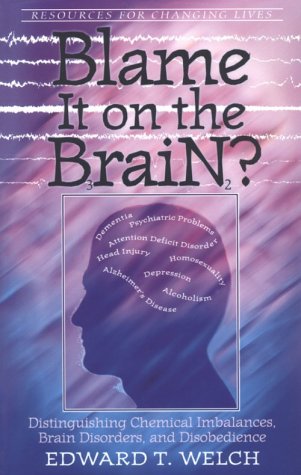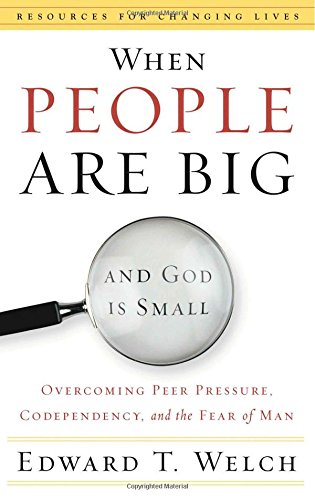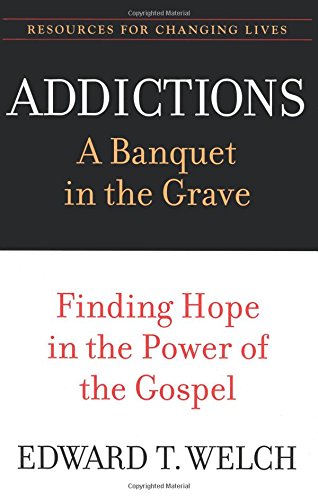
Quotes by Edward Welch
To look to Christ to meet our perceived psychological needs is to Christianize our lusts. We are asking God to give us what we want, so we can feel better about ourselves, or so we can have more happiness, not holiness, in our lives.
When People are Big and God is Small, P&R Publishing, 1997, p. 150. Used by Permission. Get this book!
If the knowledge of sin crushes, it crushes pride, not our selves.
Blame in on the Brain? P&R Publishing, 1998, p. 123. Get this book!
Consider the popular “I need sex.” When this is elbowed out of the category of desire and lust into the biological, the assumption is that sex is a biological need, nearly identical to food and water. The reasoning is that since it is a biological need, sexual self-control is unnatural, and the only option is to practice “safe” sex. Abstinence, therefore, is both old-fashioned and biologically untenable.
When People are Big and God is Small, P&R Publishing, 1997, p. 138. Used by Permission. Get this book!
With such adversaries, growing in the fear of the Lord will not be a smooth process. Instead, it will be the path of warfare. We must hate the evil and ungodly assumptions of the world, we must hate our own sinful nature, and we must hate Satan. To accomplish these tasks demands the most powerful resources we have: The Word, the Spirit, and the body of Christ.
When People are Big and God is Small, P&R Publishing, 1997, p. 101. Used by Permission.
It is much easier to talk about Jesus when His life consistently leaves us in awe. Then we repent of our fear of other people’s rejection.
When People are Big and God is Small, P&R Publishing, 1997, p. 192-193. Used by Permission. Get this book!
Holy can be defined as “separate,” “set apart,” “distinct,” or “uncontaminated.” In reference to God, “holy” means that He is different from us. None of His attributes can be understood by comparison to his creatures… Holiness is not one of many attributes of God. It is his essential nature and seen in all His qualities.
When People are Big and God is Small, P&R Publishing, 1997, p. 98. Used by Permission. Get this book!
We stand at the crossroads between fear of others and fear of God. The road leading to the fear of man may be expressed in terms of favoritism, wanting others to think well of you, fearing exposure by them, or being overwhelmed by their perceived physical power. When these fears are not combated with the fear of the Lord, the consequences can be devastating. But when God is given his rightful place in our lives, old bonds can be shattered.
When People are Big and God is Small, P&R Publishing, 1997, p. 71. Used by Permission. Get this book!
We are more concerned about looking stupid (a fear of people) than we are about acting sinfully (fear of the Lord).
When People are Big and God is Small, P&R Publishing, 1997, p. 40. Used by Permission. Get this book!
Fear of people is often a more conscious version of being afraid of God. That is, we are more conscious of our fear of others than our fear of God. Granted, fear of others is a real phenomenon. We really are afraid of the thoughts, opinions, and actions of other people. But under that we hide as best we can the more desperate fear of God.
When People are Big and God is Small, P&R Publishing, 1997, p. 33. Used by Permission. Get this book!
On one side, the fear of the Lord does indeed mean a terror of God (threat-fear). We are unclean people, and we appear before the Almighty God who is morally pure. We are rightly ashamed before Him, and punishment would be completely just… But at the other end…is a fear reserved exclusively for those who have put their faith in Jesus Christ. This fear of the Lord means reverent submission that leads to obedience, and it is interchangeable with “worship,” “rely on ,” “trust,” and “hope in.” Like terror, it includes a knowledge of our sinfulness and God’s moral purity, and it includes a clear-eyed knowledge of God’s justice and his anger against sin. But this worship-fear also knows God’s great forgiveness, mercy, and love. It knows that because God’s eternal plan, Jesus humbled himself by dying on a cross to redeem his enemies from slavery and death. It knows that, in our relationship with God, he always says “I love you” first. This knowledge draws us closer to God rather than causing us to flee. It causes us to submit gladly to His lordship and delight in obedience. This kind of robust fear is the pinnacle of our response to God.
When People are Big and God is Small, P&R Publishing, 1997, p. 96-98. Used by Permission. Get this book!
This is one of the great blessings of the fear of the Lord. We think less often about ourselves. When a heart is being filled with the greatness of God, there is less room for the question, “What are people going to think of me?”
When People are Big and God is Small, P&R Publishing, 1997, p. 119. Used by Permission. Get this book!
[Contrary to] people-pleasers, only people-lovers are able to confront.
When People are Big and God is Small, P&R Publishing, 1997, p. 41. Get this book!
The Bible always portrays our sin problem as being deeper than any pain we could experience. To ignore sin, especially when it is obvious, is to offer only a very superficial kind of love and compassion, and to withhold help that is needed at the deepest level.
Blame in on the Brain? P&R Publishing, 1998, p. 123. Get this book!
With many children labeled ADD, the arena of the heart is ignored. Yet isn’t it possible that some of what we call ADD is sinful self-indulgence and laziness? Is it possible that a prominent cause of the behaviors is a heart that demands its own way? The truth is that ADD sits at an intersection where physical and spiritual meet. Like other psychiatric labels, the root cause may be physical or spiritual; it is typically both.
Blame in on the Brain? P&R Publishing, 1998, p. 137. Get this book!
Ritalin affects a number of areas of the brain, but its mode of action is uncertain. One thing, however, is clear. Ritalin does not treat any known chemical deficiency in a child’s brain. No one needs Ritalin. Like most psychiatric drugs (including the antidepressants discussed earlier), the best analogy would be to say that Ritalin-type drugs act like aspirin: they suppress symptoms in some people, but they are not a cure.
Blame in on the Brain? P&R Publishing, 1998, p. 142-143. Get this book!
It is imperative to stress that drugs cannot change a child’s heart. If a child seems more obedient when taking Ritalin, it is because an influence on the child’s life has changed. That is, in the same way that parents and peers can influence our hearts, so our bodies can influence us. Our bodies bring pleasure and pain, intellectual clarity and confusion. Such physical changes can act like a temptation to which some children respond sinfully. When the temptation is removed, these children might be less prone to certain kinds of sins.
Blame in on the Brain? P&R Publishing, 1998, p. 144. Get this book!
Parenting those with ADD symptoms is ultimately like parenting any child: you accommodate your biblical instruction to the child’s abilities. Parenting children who are like us is relatively straightforward because we instinctively understand their strengths and weaknesses. But children whose strengths and weaknesses are out of the mainstream require more careful observation and creative teaching. Remember that these children too have God-given strengths, and whatever weaknesses they have will not slow their growth in the things that are most important.
Blame in on the Brain? P&R Publishing, 1998, p. 144-145. Get this book!
The knowledge of God cannot be denied; it can only be distorted.
When People are Big and God is Small, P&R Publishing, 1997, p. 85. Get this book!
When God says “work,” He doesn’t say that everyone must produce two tents daily. No, He simply implores us to work “unto the Lord,” to the best of our abilities (see e.g., Matt. 25:14-30; Luke 12:47-48; Eph. 6:7). Although we never minimize or excuse sinful behavior, we treat people with one talent as if they have one talent, those with five as if they have five. We treat people according to their abilities.
Blame in on the Brain? P&R Publishing, 1998, p. 55. Get this book!
Don’t say, “How could God forgive me for that!” (whatever that is). Don’t think that God’s forgiveness is a begrudging forgiveness and with that thought deny some of God’s glorious love. And don’t think that God’s promises are only for other people. If this is how you are thinking, you must realize that your own sins, no matter how big, are not bigger than God’s pleasure in forgiveness.
When People are Big and God is Small, P&R Publishing, 1997, p. 169- 170. Used by Permission. Get this book!
You may think that God is no better than you. In other words, you couldn’t imagine forgiving someone seventy times seven, so you can’t believe that God would. If this is the way you are thinking, then you are believing a lie. God is not like us. His forgiveness is not like ours. Don’t use your own weakness as the standard by which you understand God’s greatness! Just listen as He reveals Himself in His Word.
Blame in on the Brain? P&R Publishing, 1998, p. 201. Get this book!
We should be careful about saying, “Jesus meets all our needs.” At first, this has a plausible biblical ring to it. Christ is a friend; God is a loving Father; Christians do experience a sense of meaningfulness and confidence in knowing God’s love. It makes Christ the answer to our problems. Yet if our use of the term “needs” is ambiguous, and its range of meaning extends all the way to selfish desires, then there will be some situations where we should say that Jesus does not intend to meet our needs, but that he intends to change our needs.
When People are Big and God is Small, P&R Publishing, 1997, p. 89. Used by Permission. Get this book!
Scripture questions the whole purpose of psychological needs. It talks about denying self rather than feeling better about ourselves. It talks about pride, not a need for higher self-esteem. Also, it is faulty logic to draw a connection between God’s commands and our ‘need” to receive what is commanded. If you applied that logic to the command to “consider others better than yourselves” (Phil. 2:3), you would reach a conclusion that is clearly wrong. You would conclude that since others are commanded to do this, you have a God-given need to be more important than other people!
When People are Big and God is Small, P&R Publishing, 1997, p. 147-148. Used by Permission. Get this book!
They hurt us in that lies deceive us, not just other people. They persuade us that we are on top of our problem. We think we can fool others, but we can’t be fooled. With other people, the power of lies is obvious. Anyone who has been lied to knows that lies divide people; lies are the language of war. With God, lies provide evidence that our allegiances are not with Him. Instead, they show that our allegiance is to Satan – the Father of Lies – and to ourselves.
Blame in on the Brain? P&R Publishing, 1998, p. 200. Get this book!
Lying and other forms of living in the dark are usually ways to make ourselves look better before other people.
When People are Big and God is Small, P&R Publishing, 1997, p. 16. Used by Permission. Get this book!
[Why our guilt often continues:]
1. The person may be involved in things for which he or she should feel guilty.
2. The person does not believe what God says about forgiveness.
3. The person wants to use guilt as a way to punish himself to pack back for his own sins. This betrays a heart of pride that thinks it can deal, in some small way, with its own sins.
Blame in on the Brain? P&R Publishing, 1998, p. 124. Get this book!
The issue of homosexual orientation is where the church must engage the homosexual community in biblical discussion. The problem, however, is that the idea of homosexual orientation does not rest on any foundation that can be discussed. It relies on neither biblical data nor medical research. Instead, it is a political premise for gaining homosexual rights and is rooted in personal experience. Therefore, neither biblical data nor refutation of the medical literature will persuade most homosexual advocates. Ultimately, most homosexuals appeal to their own feelings and the experience of their homosexual brothers and sisters. “Homosexuality feels right to us, so it is natural. It is part of our created constitution.” But that should not keep us from examining their arguments biblically and engaging them in as much careful discussion as they are willing.
Blame in on the Brain? P&R Publishing, 1998, p. 158-159. Get this book!
Is it possible that the biblical texts were ignorant about homosexual orientation and were thus prohibiting only “unnatural” homosexual practice by participants of heterosexual orientation? This would suggest that the practicing homosexuals in the Bible were involved in homosexuality against their natural inclinations. Yet the nature of sin is that people sin because they want to sin (James 1:13-15). It comes from our desires. No one is dragged into sin kicking and screaming. Homosexuality existed in biblical times because people enjoyed it; they were drawn to it by their own hearts (Mark 7:21-23). An artificial distinction between (sinful) homosexual practice and (justifiable) homosexual orientation contradicts the Scripture’s constant connection of desire, orientation and deed. If the deed was prohibited in Scripture, the desire was too.
Blame in on the Brain? P&R Publishing, 1998, p. 160. Get this book!
Why does it feel natural? The biblical answer is relatively straightforward. Like many other sins, homosexuality does not have to be learned. The child who never witnessed a temper tantrum can be proficient at throwing them; it is an instinctive ability of the human heart. Homosexuality is natural in the same way that anger or selfishness is natural. They are embedded in our fallen humanness. Indeed, homosexuality is “natural,” but only in the sense that it is an expression of the sinful nature… Sin is more than mature, rational, conscious decisions. It is our moral inclination from birth.
Blame in on the Brain? P&R Publishing, 1998, p. 160-161. Get this book!
It is true that, on some level, there can be great affection and commitment in a homosexual relationship. But this doesn’t mean that the relationship is approved by God. If a man is unbiblically divorced and marries a woman he believes he truly loves, that union is still wrong. Adulterous relationships may, on some level, be loving and committed, but they also are still wrong.
Blame in on the Brain? P&R Publishing, 1998, p. 162. Get this book!
The biblical position is that there is a creation order for human sexuality. God’s ordained design for sexual relationships is male-female. Homosexual acts and homosexual desires, male and female, violate this creation ordinance and are thus sinful. The church must therefore warn and rebuke those who call themselves Christians but persist in homosexual practice. And the church must actively teach that homosexual affection is sinful. It can never suggest that there is morally neutral, constitutional, homosexual orientation. To urge those struggling with homosexual desire simply to refrain from acting on their desire is to sin against these brothers and sisters.
Blame in on the Brain? P&R Publishing, 1998, p. 165. Get this book!
Biology can’t make us sin. At most, biology is analogous to a friend who tempts us into sin. Such a friend might be bothersome, but he can be rebuked and resisted.
Blame in on the Brain? P&R Publishing, 1998, p. 167. Get this book!
Am I now suggesting that it is biblically possible for the body to cause homosexuality? Indeed, I am, provided – and read carefully – the word “cause” in this context means “biologically shape or influence,” not “irresistibly compel.” Used this way, there is nothing shocking about what I am saying. Our sinful hearts express themselves in behavior via hundreds of factors, biology being one. A person whose sinful heart acts out in murder may have been influenced by unjust treatment, by parents who allowed him to vent his rage on siblings and by Satan’s incessant suggestions to kill. But none of these influences remove his personal responsibility for his intentions or actions. The ultimate cause of sin is always the sinful heart.
Blame in on the Brain? P&R Publishing, 1998, p. 169. Get this book!
Remember that it is on the question of homosexual orientation that the world, the flesh, and the Devil converge. The world, with its sub-biblical views, has voted that homosexuality is normal. Our flesh wants to exonerate itself from homosexual fantasy and maintain that sexual gratification is a sacred right. And the Devil stands behind both, whispering his murderous deceptions. The deception of homosexual orientation must be exposed and corrected. It is a false teaching that will eventually lead to bad fruit. We truly do have an “orientation,” but it is a spiritual orientation that is against God. It is not a simple physical propensity.
Blame in on the Brain? P&R Publishing, 1998, p. 175-176. Get this book!
Has the church been, at times, self-righteous in its attitude toward homosexuals? Is there homophobia in some of our congregations? Do we tend to think of homosexuality as worse than the gossip and private idolatries that are rampant in the church? Has the church been unwelcoming to unbelieving but spiritually searching homosexuals? The answer to these questions is certainly yes. More specifically, the answer is, “Yes, we have sinned.”
Blame in on the Brain? P&R Publishing, 1998, p. 180. Get this book!
Persons searching for their gifts think that they can “find” their gifts in isolation from the body. They have forgotten that the orientation of God’s people is outward rather than inward. The question should be this: How can I grow in love for and service to the body of Christ? Gifts are the way we naturally love and serve. To paraphrase Augustine, if you want to know your God-given gifts, first know that the purpose of spiritual gifts is to bring unity to the church. Then “love God and do what you feel like doing.”
When People are Big and God is Small, P&R Publishing, 1997, p. 204. Used by Permission. Get this book!
If we think we are usually good, then God is usually irrelevant… Such thinking ignores the depths of sin in my own heart, and, in essence, it elevates me so that I am just a mildly flawed imitation of God rather than someone completely dependent on Him.
When People are Big and God is Small, P&R Publishing, 1997, p. 100. Used by Permission. Get this book!
God and his kingdom are, simply put, about God – the triune God, the Holy One of Israel. What are the triune God’s needs? He has no needs. He is completely fulfilled. The Father loves the Son. The Son is ecstatic about the Father and wants nothing but the Father’s will. God’s greatest pleasure is Himself.
When People are Big and God is Small, P&R Publishing, 1997, p. 153. Used by Permission. Get this book!
Either we will love and serve God, or we will love and serve our idols. Idols exist in our lives because we love them and invite them in. But once idols find a home, they are unruly and resist leaving. In fact, they change from being the servants of our desires to being our masters.
Blame in on the Brain? P&R Publishing, 1998, p. 194. Get this book!
What is the result of…people-idolatry? As in all idolatry, the idol we choose to worship soon owns us. The object we fear overcomes us. Although insignificant in itself, the idol becomes huge and rules us. It tells us how to think, what to feel, and how to act. It tells us what to wear, it tells us to laugh at the dirty joke, and it tells us to be frightened to death that we might have to get up in front of a group and say something. The whole strategy backfires. We never expect that using people to meet our desires leaves us enslaved to them.
When People are Big and God is Small, P&R Publishing, 1997, p. 46. Used by Permission. Get this book!
What exactly does medication help? Medication cannot change the heart: it cannot remove our tendency toward sin, it cannot revive our faith, and it cannot make us more obedient to Christ. It can, however, alleviate some of the physical symptoms associated with some psychiatric problems.
Blame in on the Brain? P&R Publishing, 1998, p. 109. Get this book!
Although it is not wrong to take these medications, they are rarely our first line of attack against personal suffering. Instead, we should first consider that God can bless us through our suffering, and we might also weigh the possibility that psychiatric medications could numb us to the refining benefits of suffering. There is a worthwhile point here. Although it may sound strange or even unloving to those who don’t share a biblical position, there can be real benefits from having our faith tested and strengthened through trials.
Blame in on the Brain? P&R Publishing, 1998, p. 110. Get this book!
Whether a person takes psychiatric medication or not is not the most important issue. Scripture is especially interested in why someone is taking medication or why someone is not taking medication. And it is clear that medication is never the source of our hope. With these guidelines in mind, there is biblical freedom to try, or not try, psychiatric medication.
Blame in on the Brain? P&R Publishing, 1998, p. 111-112. Get this book!
Since we were forged by the Lover, we should delight in loving and in being loved. It would be inhuman not to delight in love. It would also be inhuman if we didn’t hurt deeply when rejected or sinned against by others. The problem is not that we desire love, the problem is how much we desire it or for what purpose we desire it. Do we desire it so much that it overshadows our desire to be imitators of God? Do we desire it for our own pleasure or for God’s glory?
When People are Big and God is Small, P&R Publishing, 1997, p. 148-149. Used by Permission. Get this book!
Aren’t the most popular mission trips the ones that take us far from our own neighborhood? Russia is easy; our own neighborhood is a constant challenge. Has anyone consistently had the boldness and clarity of Jesus in testifying about the gospel? Never. Has anyone consistently avoided the fear of man in evangelism? Certainly not. There is a “foolishness” inherent in the message of the cross. The clear proclamation of the gospel does not make us look good. It doesn’t make us popular.
When People are Big and God is Small, P&R Publishing, 1997, p. 39- 40. Used by Permission. Get this book!
No second class citizen, the body is a “temple of the Holy Spirit” (1 Cor. 6:19) and is indispensable to the activity of the heart. Without it we would have no access to the physical world and we simply would not be persons. Accordingly, Paul could not imagine a person without a corporeal nature (1 Cor. 15). The whole person consists of body and heart together. Both are essential and neither can function in the material realm in isolation of the other.
Blame in on the Brain? P&R Publishing, 1998, p. 39-40. Get this book!
[The body] is the mediator of moral action rather than the initiator. In a sense, it is equipment for the heart. It does what the heart tells it to do; it is the heart’s vehicle for concrete ministry and service in the material world. In this capacity, it is not the source of sin and is never called sinful.
Blame in on the Brain? P&R Publishing, 1998, p. 40. Get this book!
Most sins are ungodly exaggerations of things that are good.
When People are Big and God is Small, P&R Publishing, 1997, p. 101. Get this book!
“Love your neighbor as yourself” (Mt. 19:19) is considered the biblical proof text (for those who need one). When interpreted through cultural spectacles, this verse means that we must love ourselves in order to love other people. But in reality the passage doesn’t even suggest such an interpretation. Jesus spoke of these words to rich young man who clearly loved himself and his possessions too much. There is only one command in the passage, and it is “love your neighbor.” Nobody, including the writers of Scripture, could have dreamed that this passage taught self-love. It took some cultural changes to reinterpret it and turn our eyes inward.
When People are Big and God is Small, P&R Publishing, 1997, p. 80. Get this book!
Scripture considers repentance a path to liberation, not condemnation.
Blame in on the Brain? P&R Publishing, 1998, p. 123. Get this book!
The basic steps of a biblical approach to helping them… First, you understand the experience of depression. Second, you make tentative distinctions between physical and spiritual symptoms. Third, this distinction will allow you to focus on heart issues. In doing this, you will point the person to Christ as her hope in suffering, you will encourage her in her faith, and you will guide her in her battle with sin. This focus on heart issues may actually relieve the depression. Fourth, if the pain of depression is excessive, consider using medical treatments to possibly ease the pain.
Blame in on the Brain? P&R Publishing, 1998, p. 115-116. Get this book!
Don’t assume that you understand what someone means by “depression.” Don’t fill in the meaning from your own experience, which may or may not be similar. Instead, listen. Allow the depressed person to fill the word depression with the meaning it has for him or her. When you do listen, you will hear pain, fear, hopelessness, dread of the future, terror, silent screams, and emptiness that threatens to destroy.
Blame in on the Brain? P&R Publishing, 1998, p. 117. Get this book!
Possible physical and spiritual symptoms in depression: Physical – insomnia or hypersomnia, significant weight changes, feeling or being restless or slowed down, fatigue, loss of energy, problems concentrating, sense of alienation from things once deemed beautiful and pleasant, feeling sad, blue, down in the dumps. Spiritual – shame, guilt, fear thanklessness, unforgiving spirit, hopelessness, unbelief, anger.
Blame in on the Brain? P&R Publishing, 1998, p. 120. Get this book!
The church must move toward the depressed person and mourn with those who mourn (Rom. 12:15), pray for God’s deliverance (2 Cor. 1:9-11), and search for encouraging words that can bless and give hope.
Blame in on the Brain? P&R Publishing, 1998, p. 121. Get this book!
With depression, assume [a lie from the devil] is present. Consider it a permanent attachment.
Depression: A Stubborn Darkness, Punch Press, 2004, p. 69. Get this book!
“Sinner” is a present-tense description of everyone, including those who have put their faith in Christ. Of course, those who have called Jesus “Lord” are justified, meaning that they are no longer guilty. Also, they have been given the Spirit, which makes them slaves to Christ rather than to sin. But we all are sinners. Perfection awaits eternity.
When People are Big and God is Small, P&R Publishing, 1997, p. 150. Used by Permission. Get this book!
Suffering is God’s surgery that leads to health when we respond by faith.
The way to eliminate shame associated with sin is to admit sin, be confident that God forgives sin, and engage in battle against it.
- « Previous
- 1
- 2
Recommended Books

Blame It on the Brain: Distinguishing Chemical Imbalances, Brain Disorders, and Disobedience
Edward Welch


